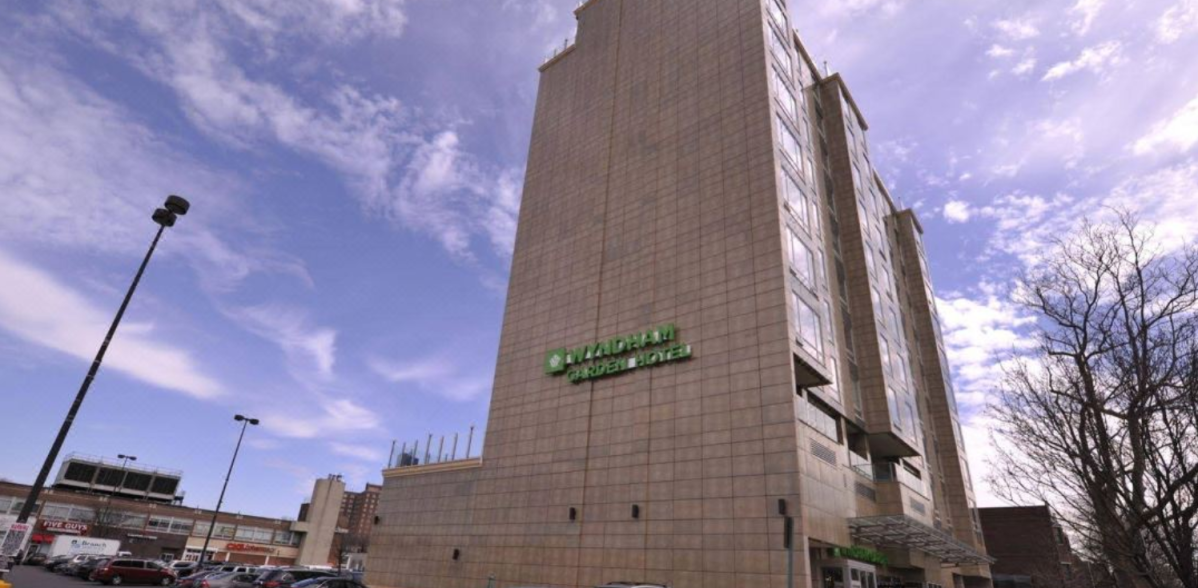Queens lawmakers are calling out the city for its failure to notify community residents about the relocation of formerly incarcerated individuals from Rikers Island to the Wyndham Garden Hotel in Fresh Meadows.
Councilmembers Barry Grodenchik and Rory Lancman, who received an onsite briefing on June 24 by representatives of the mayor’s office, said the city’s “failure to inform the community, elected officials, local community board or civic leaders, was a serious mistake.”
“Standing with the local community, our position is that the facility must prevent negative security incidents both in the hotel and in the surrounding area, demonstrate success in placing residents in permanent housing, and establish a functioning community dialogue,” the lawmakers said in a joint statement.
Since mid-March, the Mayor’s Office of Criminal Justice (MOCJ) has been working with the Office of Emergency Management to provide secure and stable housing to those leaving the city’s jail system without a place to stay, according to MOCJ.
More than 100 individuals have been staying at the Wyndham Gardens Hotels at 61-27 186th St. in response to the public health and safety threat posted by COVID-19, according to MOCJ, as it was a clear priority to keep the homeless system from the additional burden of dealing with those released from jail during the pandemic.
“Protecting the health and safety of all New Yorkers was what drove the rapid jail population reduction at the start of the COVID-19 crisis,” said Colby Hamilton, chief of public affairs at MOJC. “This and other hotels have provided an invaluable network of stable, reliable lodging for those in need, keeping people departing the jail system out of congregate housing, in example shelters, while we work with them to find more permanent living situations going forward.”
The relocation of the former inmates at the hotel sparked an online petition signed by local residents, who called on elected officials to step in and take action.
“We need to feel safe in our community. Our families and loved ones, young and old, count on us to protect them. To use this hotel as a halfway house is a betrayal of our community by both elected officials and the hotel ownership,” the petition said. “It is a betrayal of those being housed there as well; as an impoverished halfway house is not only expensive but an inadequate halfway solution that ‘kicks the can down the road’ when it comes to responsibly and properly addressing this demographic and their accompanying needs.’”
In response, Assemblywoman Nily Rozic, Congresswoman Grace Meng and Senator Toby Stavisky said the lack of transparency on the city’s behalf has been witnessed before in Queens.
“It is unacceptable that the mayor continues to utilize the same misguided approach to community engagement time and time again despite the frustrations expressed by residents and elected offices,” the lawmakers said.
According to the Grodenchik and Lancman, the hotel’s capacity is about 140 rooms, so the population will not exceed that number. The facility is being run by a nonprofit organization called Exodus Transitional Community, which is under a city contract to provide wraparound services, including case management, job placement, meals, and assistance finding permanent housing.
The residents staying in the hotel are only temporary until they have permanent housing available, according to the mayor’s office. A private security firm has been hired and is onsite to monitor the building and its perimeter as well as the surrounding area.
“Normally, those who are released from city and state correctional facilities return to their families and communities, according to the mayor’s office, while those who lack housing options sometimes enter the city’s shelter system,” the lawmakers said.
Before the city set up temporary hotel housing, some people remained in jail even after their release dates because they had nowhere safe to go, so this program also aims, according to the mayor’s office, to avoid overcrowding in correctional facilities and help stop the spread of the coronavirus.
The individuals in Wyndham Hotel do not have coronavirus; those who do are isolated in other hotels as part of the city’s pandemic response.
In response to the lawmaker’s request, Exodus has agreed to set up a community advisory board, to include local elected officials, community board representatives, and civic and tenant leaders who represent the adjacent communities. The board will meet regularly to address any issues that may arise.



































